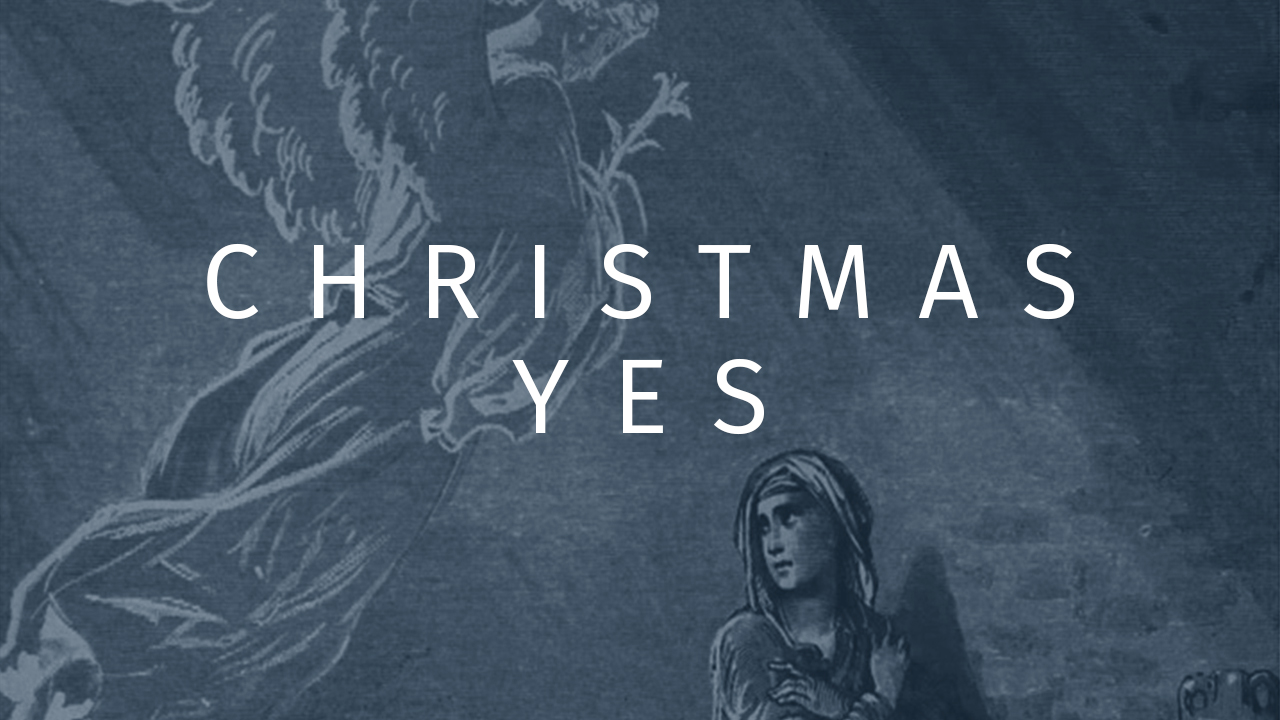
15 Dec Recap | 2015 Topical | Christmas Yes
Scripture unfolds for us a grand narrative of God’s work in the world for the redemption of the world, one that continues even today. As He directs all things for this purpose, He continues to work through His people – finite, sinful people.
In the face of what God asks, a person’s reaction is often the “Who Me?” question; the needs of a given situation and the actions that are required of us seem to be too big for us. The second question one might ask is “How Me?”. How am I going to accomplish this? How am I going to get through this?
Despite, and because of, such insignificance and inadequacy, God beckons us to trust Him to give us everything we will need to carry out His work.
The narrative of the foretelling of Jesus birth shows us this very truth – that though we may be insignificant and inadequate, we are also the favored instruments of the sovereign Lord. Though ministry is not at all about us, it does take place through us. God’s “program” in the world – the plan by which He directs all things for His glory and the good of His people – is actually carried out primarily by way of human agency.
We pick up in Luke 1:26 to see three movements in the text, the first one being the “Who Me?” movement. Upon being called a favored woman whom the Lord is with by the angel Gabriel, Mary is confused and disturbed. She is taken aback at the thought that she – a young woman in Galilee, far away from the bustling significance of Jerusalem and the domineering muscle of the Roman Empire – has been chosen by God for His purposes. Mary experiences humble surprise at this fact.
In verse 30, the second movement begins – “How Me?”. Gabriel informs Mary of what is to take place through her: the conception and birth of a baby boy who would be named Jesus. Through this insignificant, inadequate young woman will come a figure who would reign over Israel forever, the king of a Kingdom with no end. Again, Mary balks, wondering at the thought of it since she is a virgin. This is a question of inadequacy – she is doubting her instrumentality.
Most, if not all, of us can sympathize with Mary’s self-doubt. The work that God would have us do in the world is in no way easy, comfortable, or even clear. It is fraught with difficulty stemming from our own sinful natures, that of others’, the regular responsibilities of the world, and our own creaturely limitations, among many other things. We ask of God, “But how can this happen? I am… inadequate.” Asking this question is perhaps exactly where God would have us be, as we question our own ability and look outside of ourselves for what we need.
The third movement – the “Yes Me!” movement – begins in verse 35. Gabriel responds to Mary’s doubts by pointing to the power of God to accomplish His work. In effect, Gabriel is affirming Mary’s doubts – yes, Mary, you are inadequate in and of yourself, but this was never meant to be just a work of human hands anyway.
Mary’s role, then, is to simply acknowledge her appointment to this task and accept her assignment in faith. It is entirely passive in the sense that the work is ultimately accomplished by God Himself through Mary; as Gabriel says, “the Holy Spirit will come upon you, and the power of the Most High will overshadow you.” Mary’s insignificance is refuted, her inadequacy swallowed up.
To further affirm her role, God gives her strong circumstantial validation. Gabriel tells Mary of her cousin Elizabeth, who has become pregnant in her old age. Gabriel’s declaration that follows must echo even today in our thoughts as we consider the often-too-large mission that God calls us to: “For the word of God will never fail,” or in another translation, “For nothing will be impossible with God.” By these words, we are urged to let go of anything and everything that we may trust in for our work, save for the ability of the sovereign Lord to bring His will to pass.
In the face of such a declaration, Mary accepts her role. Despite incessant insignificance and self-doubt, she declares herself to be a servant – a bondslave – of the Lord. Though she has no certainty about how the situation will end, and though she faces great consequences if she is mistakenly suspected of adultery, she gives a joyful, holy, “Yes, me!”.
Mary, of course, is unique as mother of the Messiah according to the flesh. None of us will play this same role. But the insignificance and self-doubt, which threaten to overwhelm her in the face of what God asks, are illustrative of every believer’s condition. Who can make the dead sinner live? Who can teach the living sinner to be holy? No creature, not one. Find now the end of your ability and reckon upon the alien significance that is bestowed on you. The sovereign Lord, He of unfailing words, fills His people with His own Spirit and delights to overshadow them in His own power. At His hand we find sufficiency for our every need.
-Brian Barbee
To listen to, view, or download this sermon, visit our website here.
Worship Songs from the Weekend
- Hark! The Herald Angels Sing: Luke 2:8-18
- Great and Mighty King: Psalm 47:6-8, Revelation 5:11-14, Isaiah 6:1-3
- O, Come All Ye Faithful: Luke 2
- This I Believe: 1 Corinthians 15, John 3:16, Romans 1:16-17, Hebrews
- Worthy of It All: Psalm 51:16-17, Psalm 139:23-24, Amos 5:21-24, Psalm 19:12-14


